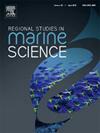Contraventions of MPA regulations by the South African demersal trawl fisheries: Evidence from loss and damage of scientific instruments
IF 2.1
4区 环境科学与生态学
Q3 ECOLOGY
引用次数: 0
Abstract
Marine protected areas (MPAs) are generally considered safe havens for marine organisms and resources by virtue of being able to exclude threats from within their boundaries. However, the benefits of MPAs depend on compliance to MPA regulations, and there is little known globally about the amount of illegal fishing that happens within MPAs. We used the damage and loss of passive acoustic moorings within MPAs on the west coast (Child’s Bank) and east coast (Aliwal Shoal) of South Africa as evidence for illegal fishing in MPAs and to initiate investigation on the intensity of fishing activity within MPAs. These moorings were deployed to study regional soundscapes and the seasonal acoustic occurrence and behaviour of some of the critically endangered marine mammals in the Southern Hemisphere. Scientific instruments were deployed within MPAs as these areas were perceived safe and excluded trawling. Surprisingly, both moorings were trawled up, with part of the east coast mooring brought up in October 2023 and the entire other mooring brought up in January 2024. Vessel tracking data also confirm illegal fishing within MPAs. These incidents provide a novel approach on the use of loss and damage of scientific instruments as evidence for illegal fishing in MPAs and highlight the need for more monitoring and patrolling of these areas to ensure proper compliance and management in South Africa and likely the rest of Africa. To conclude, it is gravely concerning that MPA regulations are contravened without any consequences, undermining the conservation, socioeconomic and research-related objectives of MPAs.
求助全文
约1分钟内获得全文
求助全文
来源期刊

Regional Studies in Marine Science
Agricultural and Biological Sciences-Ecology, Evolution, Behavior and Systematics
CiteScore
3.90
自引率
4.80%
发文量
336
审稿时长
69 days
期刊介绍:
REGIONAL STUDIES IN MARINE SCIENCE will publish scientifically sound papers on regional aspects of maritime and marine resources in estuaries, coastal zones, continental shelf, the seas and oceans.
 求助内容:
求助内容: 应助结果提醒方式:
应助结果提醒方式:


